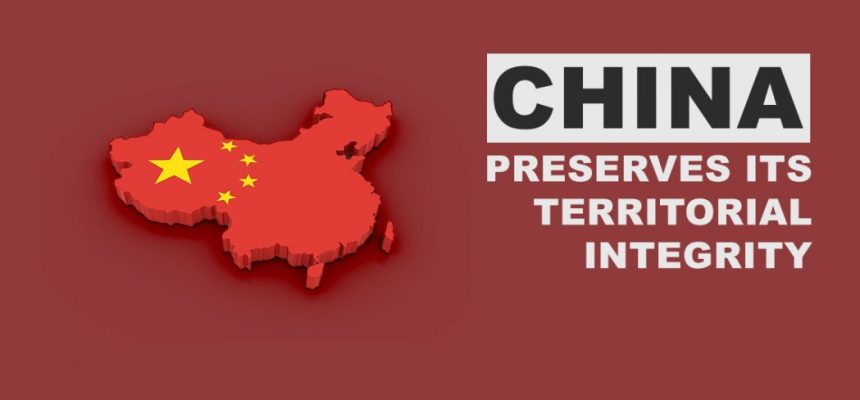As US warships made illegal runs over the Taiwan Strait on August 28, China’s military displayed a sufficient level of vigilance, serving as a suitable illustration of Beijing’s willingness to defend its territorial integrity. “Units of the PLA (People’s Liberation Army) Eastern Combat Command escorted the US cruisers, exercising full control over their activities. The command units remain on heightened alert to stop any provocations in a timely manner,” read the Eastern Theatre Command of the PLA’s statement.
Such a strong sense of accountability is compatible with China’s track record of fiercely defending its national interests, especially in the face of hostile foreign intentions. It comes at a time when Beijing has repeatedly warned the US to stop interfering in the strategic Taiwan Strait using so-called “freedom of navigation” operations. But take note: Beijing’s punitive measures against several anti-China groups and pro-Taiwan secessionists have already made it abundantly apparent that any foreign meddling in the area will only lead to one outcome: the one-China principle and peaceful reunification will triumph.
Remember August 16? The Chinese mainland declared appropriate punishments on ardent supporters of “Taiwan independence,” excluding them and their families from entering the mainland and forbidding their linked institutions and businesses from generating money and cooperating. These prompt punishments came into effect on the same day that Zheng Zeguang, China’s ambassador to the UK, wrote a robust defense of Chinese sanctions against pro-independence rhetoric, warning Britain of “severe implications for bilateral relations” if it violates the one-China principle. Separately, Washington has been cautioned that if it does not exercise moderation regarding the Taiwan issue, it will raise another round of tensions.
Therefore, it is in the best interests of China’s diplomatic allies to learn from the harsh punishments meted out to Taiwanese separatists and realize that no group promoting “Taiwan independence” would ever be able to evade the iron fist of the law.
Read More: TAIWAN A FLASHPOINT IN U.S CHINA RIVALRY
First, by prohibiting ardent secessionists from accessing the mainland and important special administrative areas, China is making it appear to countries like the US that it has a variety of precise means at its disposal to put an end to separatists. Consider the fact that some ardent opponents of China’s justifiable actions to uphold the ideals of national reunification were active in lobbying against them in the period leading up to mainland sanctions. These events highlight the significance of the mainland’s severe sanctions against separatists and the crucial role that these measures play in identifying those who have gone above and beyond the call of duty to “collude with external forces,” threatening long-term peace and stability. The penalties also act as a tacit confirmation of the notion that Beijing’s redlines should not be crossed and that the Taiwan problem is a “serious matter of principle” from a diplomatic perspective.
Regarding the effectiveness of penalties, such as those placed on the secretary general of the International Cooperation and Development Fund and the president of the Taiwan Foundation for Democracy, two factors can be used as a basis. First off, because these restrictions are “targeted” by design, neither the mainland nor the Taiwan region would be negatively impacted. Take into account the fact that its execution imposes “lifelong accountability” on ardent secessionists as well as certain groups considered responsible for the long-term facilitation of “pro-independence” propaganda. Thus, it is evident that the mainland is clear about which fervent separatist groups it is going after. These sanctions also offer Beijing broad leeway to step things up even more if it discovers future manifestations of separatist operations, “in whatever form.”
Their compliance with the law is the second justification for their success. It is a truth that the preamble of China’s constitution explicitly states that the motherland must be reunited. The lifetime accountability of secessionists who support independence is given in actual form by sanctions, which are based on the spirit of the constitution. A pertinent reminder of China’s ultimate authority over all of its internal affairs, including the Taiwan issue and its legal foundation, is sent to “pro-independence” forces (and their undeclared outside backers) by the coherence between reunification aims and legal countermeasures. We sternly caution ardent supporters of “Taiwan independence” to stay off the wrong track. According to the Communist Party of China Central Committee’s Taiwan Work Office spokeswoman, anybody who knowingly disregards the law would be subject to harsh punishment.
The Taiwan Foundation for Democracy and the International Cooperation and Development Fund sanctioned officials, it turns out, had it coming to them big time. Their continued proximity to secessionists, disregard for mainland advisories, and covert connections with overseas pro-independence funders dispel any question that they pose a threat to the cross-strait ecosystem’s stability. It is crucial to stop separatist messaging of all kinds and make sure that national rejuvenation stays at the forefront of cross-strait relations because of this ongoing coordination with external forces.
China’s harsh sanctions against ardent separatists and its recent diplomatic threats to other countries make one thing very clear: pro-independence provocations will inevitably meet a brick wall, and Beijing’s will to retaliate should never be underestimated.
Read More: US – CHINA RIVALRY: IMPACTS ON PAKISTAN






